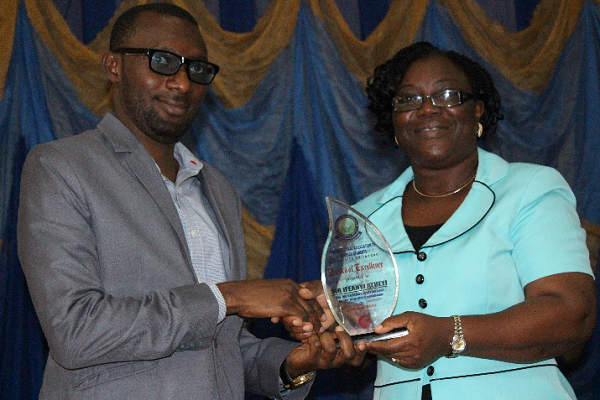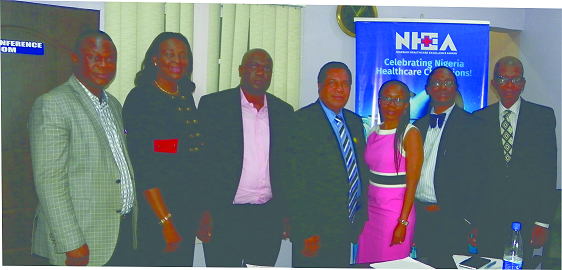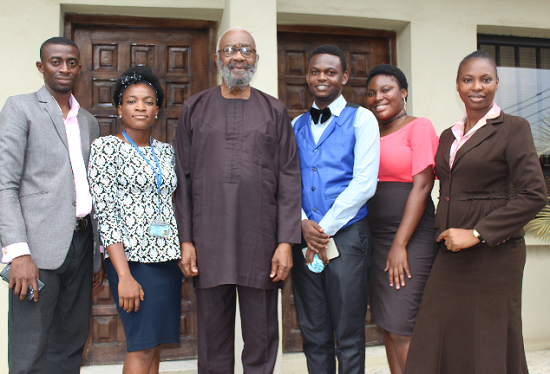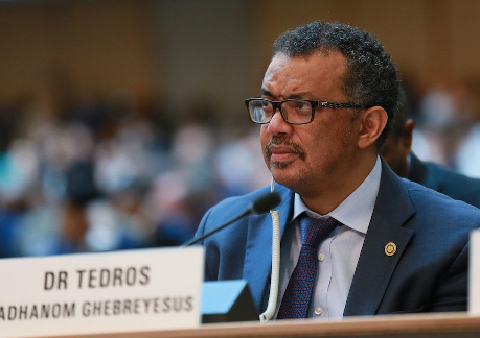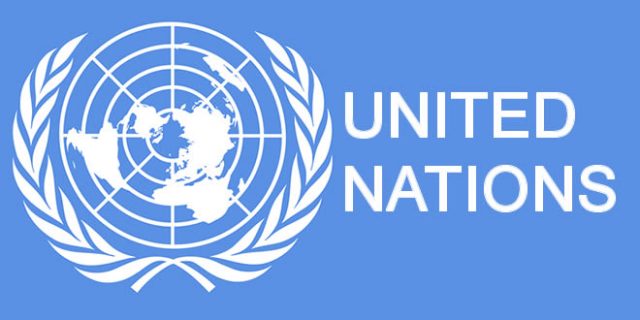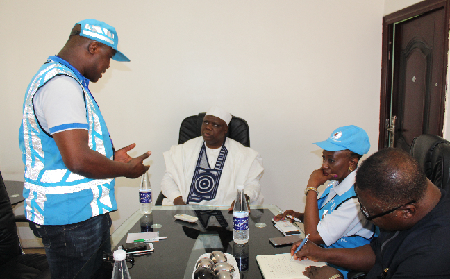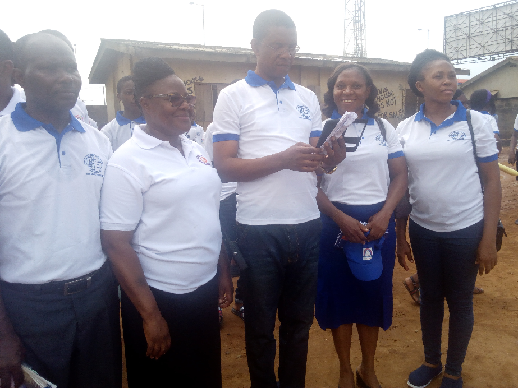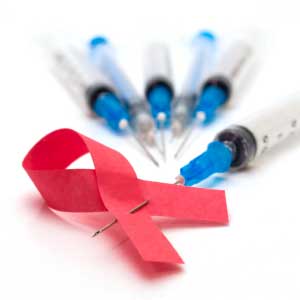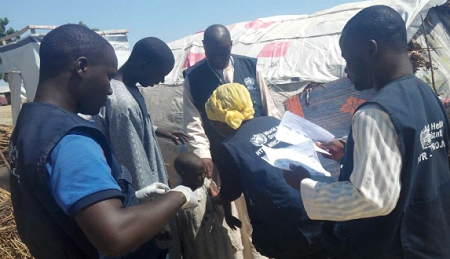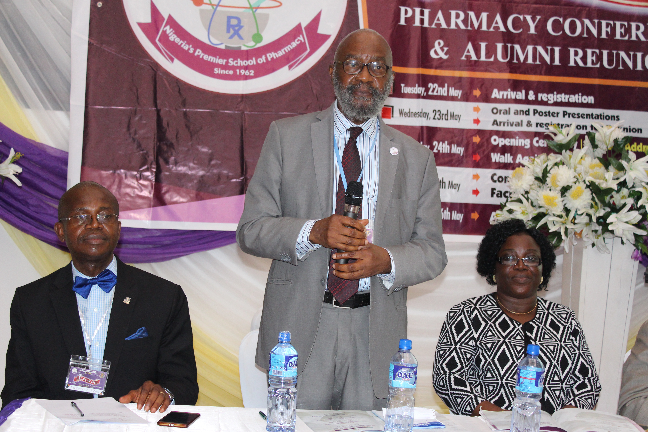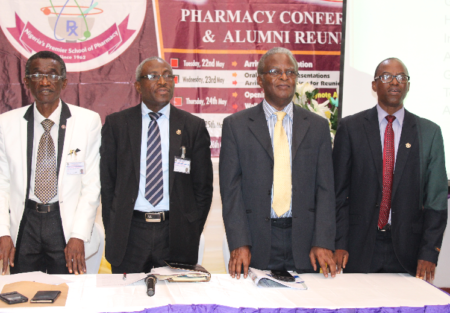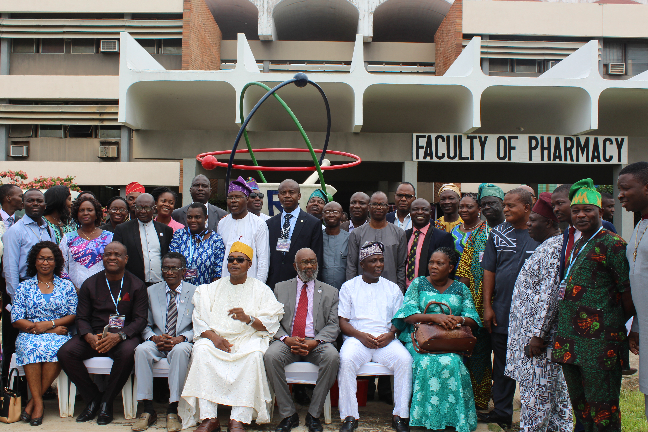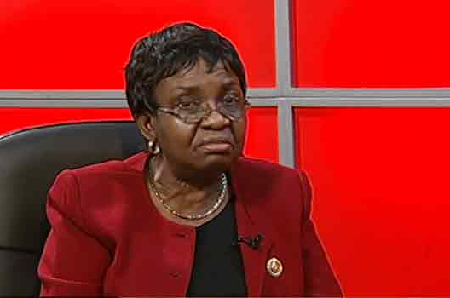Risperdal is an antipsychotic that is classified as?
A butyrophenone
B thioxanthene
C atypical
D substituted benzamide
E diphenylbutylpiperidine
Meet Our Personality For June – Pharm. Chima Ogbu
Pharm. Chima Ogbu, a good pharmacy practice and public health advocate, is the national publicity secretary, Association of Community Pharmacists of Nigeria (ACPN), and chief executive officer (CEO), Medigate Pharmaceutical Company Limited, Port Harcourt, Rivers State.
Born in Port Harcourt on 19 February, 1967, Ogbu, who hails from Umuegbu, Umuma Isiaku, in Ideato South Local Government of Imo State, had his early education at State School, Rebisi, Port Harcourt, and Bishop Shanahan College, Orlu, Imo State. His excellent academic and leadership qualities had begun to manifest by now and he was made editor-in-chief of the school’s magazine called “The College Echo”.
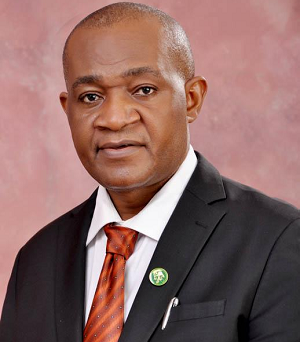
As a pharmacy undergraduate at the University of Nigeria (UNN), Nsukka, Ogbu left an indelible mark as the general secretary of the Pharmaceutical Association of Nigeria Students (PANS), and faculty representative in the Students Union Government.
A team player with enormous social capital, Ogbu believes in the universal principle of interconnectivity and interdependence in human relationship; and to his credits are numerous commendations and awards, including the Merit Award of the Pharmaceutical Society of Nigeria (PSN), Rivers State, in 2014.
Ogbu has served as a member of Conference Planning Committee (CPC) and Local Organising Committee (LOC) for the ACPN and the PSN in recent conferences. He has also served as a PIC official for the PCN, as well as other numerous professional engagements.
An entrepreneur par excellence, Ogbu has attended several national and international conferences, seminars, trainings and workshops, organised by ACPN, PSN, CPA, FIP, WAPCP and several others. He was part of the Nigerian delegation to the historic 2012 FIP Centennial, held in Amsterdam, The Netherlands.
A renowned social media campaigner in the health sector, Ogbu is an administrator of several online health platforms and groups, including the New Pharma Frontier; Community Seed Group; and the Pharmaceutical Society of Nigeria Group on Facebook.
As a capable and dependable manager, Ogbu regards responsibility and accountability as fundamental and non-negotiable attributes of an effective leader. He played a lead role as PSN-Rivers State Project Committee secretary in the recent negotiation, purchase, and delivery of 268 plots of lands by pharmacists at Prime Pharmacists Estate, Isiokpo, Rivers State.
Pharm. Ogbu is a dedicated family man. He is happily married to Mrs Amaka Modesta Ogbu (Nee Nworah), and the marriage is blessed with children.
What Shall We Tell The President?
Nigeria, like most African countries, has been mismanaged by her leaders since independence in 1960. Like a fairy-tale, the hopes and fantasies associated with the victory of the independence struggle soon disappeared and were replaced with despondence, strife and unending social crisis. The unity of purpose among the first generation of leaders, particularly as they fought the colonialists for freedom, did not last long and they became mortal enemies after the first election. Regrettably, they could not manage their new-found power and authority. One thing led to the other and, before they realised it, the nation was on fire.
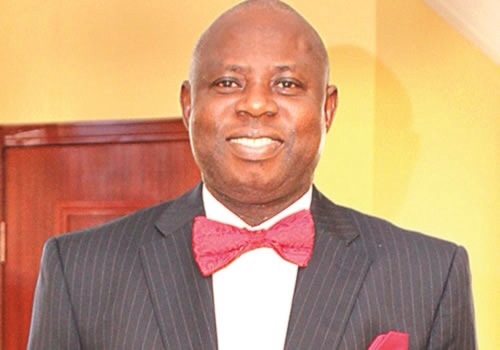
The civil war experience was bitter, with catastrophic consequences, as so many lives were cut short, dreams shattered and hopes dashed. Since the end of that war, Nigeria has been as Max Romeo sang in his song, “one step forward, two steps backward’ – except that the case here may be five steps backward.
The looting and mismanagement by the political leaders of the second republic brought the military generals, who did not waste time to show that they were better at stealing than their civilian counterparts. The hope of better governance was restored when General Obasanjo was elected as president in 1999. It did not take long before the new president, a former military head of state, frittered away all the goodwill associated with his election and once again, dashed the hopes of the people through unending bickering with his deputy, playing god and embarking on the ill-advised attempt to tamper with the constitution and extend his tenure.
The regime of Alhaji Umaru Musa Yar’Adua was short-lived due to ill-health, but Nigerians will never forget how some cabals held the nation by the jugular and used the opportunity to further impoverish the nation. They tried, albeit unsuccessfully, to prevent the then vice-president, Goodluck Jonathan, from taking over as acting president and subsequently fought hard to prevent his election as president in 2011.
Thinking that we had a new messiah who would lead us to the desired destination, Nigerians trooped out and defied all odds to vote Goodluck Jonathan as the first PhD holder from a minority tribe to rule the country. Unfortunately, the new president faltered where it mattered most. He failed to show leadership and he succumbed to the pressure of the people urging him to “take his chance”. He opened the treasury for them to loot to their satisfaction and the nation cried to high heavens for a change, and that change we got in President Mohammed Buhari (PMB) who was elected as president in 2015.
Heightened expectations
Like most Nigerians, I believed that PMB was good for us and, at that critical period, we needed somebody who loves the nation and who would not steal. Besides, at over 70 years of age, no one expected that the new president would pursue anything that was not in the overall interest of the nation.
We were ecstatic at PMB’s inauguration and we refused to listen to those who were (and are still) crying about “islamisation’ and “nothernisation” agenda. We called them “wailers”; we rebuked them for crying over “spilt milk” and we asked them to watch as the president would turn the country into the “Eldorado” that we had always yearned for since independence.
The president started well, and we were applauding as he pursued the treasury looters and exposed the hypocrisy of the fake leaders around us. He blocked the leakages and temporarily put “professional looters” out of job through the implementation of the Treasury Single Account (TSA). He gave us cause to be happy and be full of expectations of a better deal between the leaders and the people.
Unfortunately, some unfavourable developments including low production and reduced international price of crude oil tasked the economic management ability of the government and the nation succumbed to a biting recession which severely affected the lives of ordinary citizens. Despite the unfavourable conditions of our environment, people were still ready to give the PMB government the benefit of the doubt and we all joined the chorus claiming that the bad economy was due to the actions and inactions of the previous government. I remember writing articles urging people to be patient and wait for the dividends of PMB government that would soon come their way.
Back to the past
Much to our disappointment, things are getting worse rather than get better. The old issues that we thought were gone with the old government are back in the new regime. Now, there are rampant cases of corruption by government officials and no one seems to be afraid anymore. The government itself appears to be falling apart with in-fighting between ministries and agencies that are supposed to be complementing each other. The “cabals” are back in business and they seem to be stronger this time, directing the affairs of government according to their whims and caprices.
All the gains of the change that we voted for, as being touted by the government’s information machinery, do not have a direct impact on the people. The insurgency in the north east has grown bigger after the initial lull in their activities. Some of the Chibok girls are still in captivity and others from Dapchi have been captured to join their rank. The people of yesterday have regained their voice and strength and they are shouting on rooftops that PMB should be dumped out of the presidency.
To tell or not to tell?
As we approach another presidential election in 2019, political permutations have started again. General Obasanjo wrote a letter to PMB like he did to Goodluck Jonathan before the 2015 election and, expectedly, this letter has been ignored as PMB has declared his intention to run for a second term in office. I have also read so many articles on this subject and I particularly like the one from Simon Kolawole (THISDAY) titled “Shall we tell the President”, where he chronicled the “sins” of the president and asked him to fulfil his promises.
There are many issues to raise, at this point, with the President but the big questions are: Is he listening? Does he read what is being written about him and his government? Is anyone responsible for bringing these issues to his attention? Will he ever respond by changing the way the country is governed?
I think the problem started from the inauguration of this administration. The president dithered and allowed opposition to take over the headship of both houses of the National Assembly. It was the first test of leadership and the president failed woefully to take charge. He created a gap that those who did not share his vision for this nation took advantage to entrench themselves in positions of authority. He was also indecisive in the appointment of aides who would help him to deliver his promises to the people and, at the end of the day, he gave us a cabinet that is not different from what we are used to.
The wheels of government have continued to roll so slowly as we move from one crisis to the other: unemployment and underemployment are staggering to dizzying heights; the youths are roaming the street and finding solace in drug abuse and criminality; insecurity is the order of the day, as armed robbery, kidnapping and other vices are on the increase; ravaging and abject poverty has turned everybody into beggars and women (young, old, married or unmarried) into prostitutes; businesses struggling to survive under strenuous conditions; power failure still the same; as well as heightened ethnic divisions, particularly with killings by herdsmen.
Groping for answers
What has happened to the president we loved so much? Where is the change promised? I believe the situation is not beyond redemption and that the president can turn things around if he really desires to do so. He can change everything and people around him and do what good leaders do: deliver on promises.
I still think that most Nigerians are in love with the president and are hoping that he can turn things around. I have not seen a better candidate amidst those who are currently jostling for the position, especially among the ones who have the platform that can make it happen. What we probably need is a “new improved” PMB.
This brings us to the subject of this piece: What shall we tell the president? In answering this question, I considered the travails of John the Baptist, as recorded in the Bible and the question he was forced to ask Jesus when hope was fading and the situation of things around him was bleak and irredeemable. That question is relevant to our current situation in Nigeria and what I consider as the appropriate thing to tell the president will come in the form of a question: “Are you the one who is to come, or should we expect someone else?”
Dear president, are you the man we voted for in 2015 to deliver us from the ruins of years of mis-governance in Nigeria? Are you the one who will make our economy work for most Nigerians? Are you the one who will create jobs for millions of Nigerians who are jobless? Are you the one who will stop the senseless killings across the country? Are you the one who will provide security for everyone, not minding their social status, age, gender, or ethnicity? Are you the one who will give us the required infrastructures like good road networks, airports, etc? Are you the one who will give us uninterrupted power supply? Are you the one who will unite Nigerians under one umbrella of peace, justice and harmony? Are you the one who will bring prosperity back to Nigeria and make the nation to fulfil her potential?
Or Mr President, should we look for someone else?
Over to you, sir.
Chief Jacob Odulate: Alchemist of the Famous Alabukun Powder
About one hundred years ago, Jacob Sogboyega Odulate, a young chemist and drug maker in Sapon area of Abeokuta, made a discovery that transformed the healthcare industry in West Africa. Odulate (fondly called Blessed Jacob by his friends), had nursed a dream of establishing the first indigenous pharmaceutical product in Nigeria for years. In 1918, while working in his laboratory, which also served as his office and consulting room, Odulate, with the assistance of his wife and children, formulated the famous Alabukun Powder to treat multiple ailments, which affected some of his patients.

As already noted, Odulate’s revolutionary formulation didn’t come by chance; it took many years of hard work and apprenticeship under the renowned pharmacist Dr Sapara, under whom he acquired the basic knowledge of making curative products. Alabukun Powder, whose ingredients were sourced both locally in Nigeria and in Liverpool, UK, was made of 760 mg of acetylsalicylic acid and 60 mg of caffeine, making a total of 820 mg in each sachet. It is known to be effective in the treatment of migraine, toothache, sore throat, neuralgias, myocardial infarction, transluminal angioplasty, ischaemic attacks and prevention of blood clots.
Alabukun, which is another name for God in Yoruba means “The Giver of Grace”. Its enduring success over the years is intertwined into the fabric and history of Nigeria’s healthcare industry.
Unprecedented popularity
The impact of this innovative and potent patent medicine was unprecedented, as it turned out to be a huge success as soon as it was introduced into the market. A major reason for its popularity was because it was relatively cheap and handy, making it affordable to local consumers.
While most pharmaceutical products that have endured over the years have had to rely on advertising to stay afloat in consumers’ minds, Alabukun Powder has been an exception to this rule. It has endured in the Nigerian and indeed the West African pharmaceutical market for more than a century with little advertising.
According to reports, information about the drug was spread by word of mouth involving consumers who attested to its effectiveness and affordability. As a result, many drug shops were encouraged to recommend it as a treatment for cold, pain, feverishness and headache. Alabukun has been fondly referred to as “gbogbonise”, or a “a drug that cures all ailment,” especially by Yoruba-speaking Nigerians. Its rising popularity among local consumers in South-west Nigeria at that time stimulated its quick spread to other parts of the country and to neighbouring countries in the West African region.
Biographical background
Chief Jacob Shogboyega Odulate was born in 1884 to the polygamous family of Pa Odulate in Ikorodu, Lagos. He stopped schooling at the young age of 12 and moved to Abeokuta, Ogun state, at the age of 14 in search of greener pastures. According to an account by his oldest surviving daughter – Chief (Mrs) Stella O. Odesanya, MFR – the young Odulate trekked from his hometown in Ikorodu, Lagos all the way to Abeokuta on foot for three months. It was in Abeokuta he met Doctor Sapara and volunteered to be his apprentice.
After serving Dr Sapara for many years, Blessed Jacob moved on to establish his patent medicine supply store in Sapon area of Abeokuta, which was a short walking distance from his future three-storey landmark home in Ijemo Agbadu, Abeokuta.
From the proceeds of the sale of Alabukun Powder, Alabukun Mentholine and other drug products he made, Odulate was able to sponsor his children to some of the best universities abroad at that time to further their education. One after the other, his children went off to study at Durham, Newcastle, USA and London to qualify as educationists, medical doctors, lawyers and engineers.
One of his children, Chief Mrs Folanke Solanke, was Nigeria’s first female lawyer and first female Senior Advocate of Nigeria (SAN). In 1966, she established the first law firm to be owned by a Nigerian woman and called it Alabukun Chambers to honour her father’s legacy.
One of his granddaughters name Toyin Odulate is following his entrepreneurial legacy. She is the founder of Olori Cosmetics, an African-themed beauty company dealing in hair, bath and body care products.
Despite Blessed Jacob’s demise in 1962 around the age of 78, he continues to be remembered for his landmark contribution to healthcare in Nigeria. This year, 2018, his family, friends and well-wishers are celebrating the 100th anniversary of his legacy – The Alabukun Powder.
References:
“The happy life of a pioneer” by Chief (Mrs) Stella O. Odesanya, MFR – Nigerian Tribune Newspaper
“Reaching for the Stars” an autobiography of Chief Folake Solanke SAN.
Tackling Fasting-related Health Problems
Studies have shown that fasting has enormous benefits for our body, mind and spirit. From losing weight to stopping smoking habit, fasting can be an effective tool to achieve optimum wellbeing. I have developed the habit of fasting at least once in a week throughout the year.
The Ramadan period provides an opportunity for people who are fasting to rejuvenate, reenergise and revamp their health. However, despite the benefits of fasting to our overall health, it can sometimes predispose people to certain health challenges.

Below are some of the challenges and ways to tackle them.
- Headache. During Ramadan, especially the first week, a myriad of those who are fasting can be prone to headache due to the body adapting to the pattern of fasting, dehydration, change in sleeping and working patterns, as well as stress. The way forward is to be super-hydrated during non-fasting period of the day. You should endeavour to take adequate water to compensate for dehydration during the non-fasting period. It is also necessary to avoid strenuous activities during fasting.
If you still have persistent headache despite drinking adequate water, analgesics may be required. In severe cases, fasting should be terminated to allow for required treatment.
- Indigestion. Indigestion is a common experience during Ramadan for many people who are fasting due to intake of high calorie meals (carbohydrates and fat) during the eating period early in the morning and sometimes at evening after breaking the fast. This may occur due to disruption in usual sleeping pattern.
To avoid indigestion, healthy food should be eaten always; avoid too much spice and fats in your food. Small regular meals during non-fasting hours should be encouraged. If necessary, Antacid, proton-pump inhibitor like omepazole and H2 antagonist like ranitidine can be used.
- Asthma: Asthma patients are allowed to use their inhaled medications during the fasting period. It is also important for asthma patients to be sincere with themselves as to whether they can fast or not. Those who have severe asthma need oral medications to control their breathing and should avoid fasting. For patients who can still fast, it is important to use long acting beta-2-agonist like Advair during the non-fasting period of the day.
- Constipation: Due to dehydration and change in diet pattern, constipation is one of the health problems people who are fasting often complain about. To avoid constipation, adequate water, not just fluid (tea, coffee or soft drink) should be consumed. Food rich in high fibre like bran cereal is recommended.
Fruits and vegetables having high water content like watermelon and cucumber, should be consumed. If required, laxatives like methycellulose and isphagula husk can be used to relieve the condition.
- Diabetes: Due to the need for a stable blood glucose level for diabetes control, diabetic patients must be careful during fasting to avoid hyperglycaemia or hypoglycaemia. Most patients with insulin-dependent diabetes are advised to stay away from fasting.
However, Ramadan can be used as a vehicle to control diabetes with the assistance of a dietician. High fibre and low glycaemic index foods are encouraged. For many patients with diet-controlled diabetes, where weight loss is advised, fasting may have a beneficial effect on their health.
- Reumatoids: Dehydration and extra physical effort during prayers can cause symptoms of pains and aches to people, especially the elderly, during Ramadan. To avoid pains, moderation in non-compulsory prayers is important, proper hydration during non-fasting hours and light exercise may be useful. If required, analgesic should be used during meal at sunrise and sunset.
- Cardiovascular diseases: Studies have shown that fasting improves cardiovascular health. It improves lipid profile, weight loss, proper circulation of blood, heart strength, as well as the overall wellbeing of the heart and the cardiovascular system. However, care should be taken by cardiovascular patients to continue taking usual medications. Of course, the timing of the medications should be adjusted where possible to accommodate the fasting hours.
ACTION PLAN: Be conscious of what you feed your mouth. Take more of fruits, vegetables, seeds, nuts and grains. Avoid processed food. Eat moderately.
AFFIRMATION: I eat my food like medicine, not poison. I am blessed and highly favoured.
Now That NAFDAC is Back at the Ports
The recent directive by the federal government that the National Agency for Food and Drug Administration and Control (NAFDAC) should return to the seaports, one year after the agency was ordered to vacate the same ports, is a laudable gesture – even though it has once again highlighted how the nation’s development has continued to be impeded by baffling policy summersaults.

For keen observers, who are familiar with the seaports’ imbroglio over the years, this latest directive will not come as a surprise, as there has never been policy consistency from the government on the issue. While there have been several reformative measures to better safeguard and sanitise the ports, none has ever been fully implemented before another is introduced.
Within the past 16 years, the federal government has, at various times, sacked NAFDAC, the Standard Organisation of Nigeria (SON) and some other agencies from the nation’s seaports. The reasons for the move are usually the same: The need to ensure efficient cargo clearance, to fight corruption, and to enhance business operation contributions of the ports. Curiously, no sooner had the government taken such drastic step than it would rescind, especially after seeing how much damage had been done to the country through the absence of these key agencies. More bafflingly, the government never seems to learn from past experiences as this inimical cycle of sack-and-recall seems to have become a norm.
The last sack of NAFDAC from the ports was announced on 7 June 2017 by the then Acting President, Prof. Yemi Osinbajo who is also the chairman of the Presidential Enabling Business Environment Council (PEBEC). Osinbajo had cited the need to make the seaports more efficient and create a better environment for business operations as the rationale for the decision. However, months after the decision was taken, the nation had begun to face a monstrous drug abuse problem, with many communities flooded with controlled regulated products like tramadol and codeine. Then, following an embarrassing BBC expose on codeine abuse and the national uproar that followed it, the government eventually hearkened to the protest of NAFDAC and once again reversed its decision and recalled the agency back to the ports.
The central question that cannot but boggle the mind here is: Why should a serious government keep going back and forth in handling a critical issue as controlling the influx of sensitive substances, food, drugs and other regulated products into the country?
Incontrovertible evidences have shown that without NAFDAC’s presence at the ports, its ability to effectively control the importation of food, drug and other regulated products posing public health and security threats to the nation is seriously limited. It thus needs to be emphasised that, as much as government desires to enhance ease of doing business at the ports, placing this above the safety of Nigerians is not only injudicious but exceedingly counterproductive.
NAFDAC has a fundamental role to play at the ports. The agency has to ensure that counterfeited, adulterated and substandard food and drugs, as well as other controlled or harmful substances do not enter the country illegally. This task is daunting enough, even with the agency at the ports, as many of the nation’s land borders are appallingly porous, giving unfettered access to charlatans in business to bring in all sorts of products. To combine this with expulsion of NAFDAC from the ports and still expect the agency to deliver on its mandate is highly preposterous.
The Nigerian government must henceforth desist from sacking NAFDAC from the nation’s seaports. Rather, it should ensure, through its ports reforms and other policy initiatives, that the agency is fully supported and repositioned to effectively discharge its duties, not only at the seaports but other points of entry into the nation.
We must also commend the new NAFDAC Director General, Prof. Mojisola Adeyeye, for steadfastly pushing for the return of NAFDAC to the ports to enable the agency deliver on its mandate. We urge the agency to intensify efforts to ensure food and drug products that pose threat to public health and national security are not in our communities.
NAFDAC must avoid all distractions and keep to its maxim of working to safeguard the health of all Nigerians. It is only by consistently doing this right that the agency can justify its presence at the ports and its existence in the nation.
Annual Zonal Scientific Conference of Nurses & Midwives Holds in Benin
The National Association of Nigeria Nurses and Midwives (NANNM) Zone C, in collaboration with the Nursing and Midwifery Council of Nigeria (NMCN) is set to hold its Annual Zonal Scientific Conference, themed: The role of Nursing in Leading and Advancing Global Health.
The conference, which will run from 23rd – 27th July 2018, is scheduled to hold at Plot 6, Alexander Ogun Street , opposite Palm Garden, Evbuoriara Sapele Road, Benin City, Edo state.
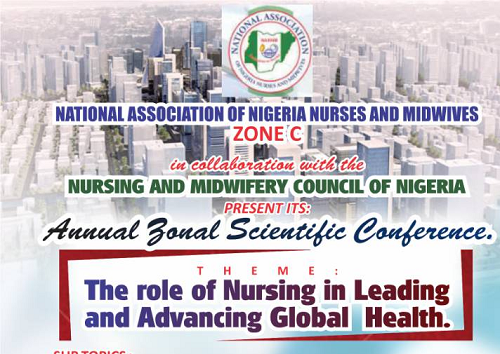
According to the conveners, the conference attracts three Credit Units (3CU) of the Nursing and Midwifery Council of Nigeria.
The following sub-topics will be treated at the programme:
- Nursing Education reforms: How far, So far?
- Technology and Nursing practice
- Transforming Healthcare through quality clinical practice
- Understanding live experiences to advance nursing
- Nursing research: A tool for Advancing Nursing
- Nursing governance and management practices
- Decision and policy making in healthcare: The role of the Nurse
- Exploring latest innovations and advances in nursing practice
- Mentorship: A tool for Advancing Nursing.
- Transforming Nursing through Education
For more enquiries: Call -08023640944, 08023006960, 08066101538
24th Law: If You Want to Succeed, Do What Successful People Do
I f you are not willing to risk the unusual, you have to settle for the ordinary. – Jim Rohn
Define your direction
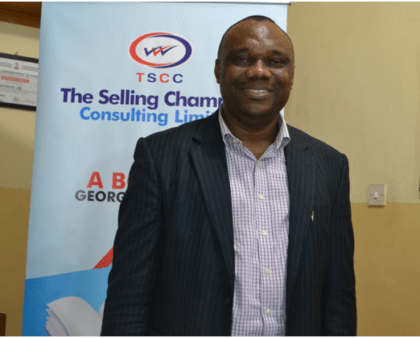
My father once told me that a man who forgets where he is coming from is doing himself a great disservice because he will likely not know where he is going. You start from the known to the unknown.
In the journey of life, you should take notice of your starting point, the distance you have covered in the journey and the remaining expanse to cover. This method gives direction. When you know the efforts you have invested already, you won’t have any other choice than to continue moving forward. This is why I maintain that you should be aware all the time in your sales job and other life’s endeavours.
Discover you
I want to talk a little about self-awareness because it has everything to do with success. It is when you are aware from within that you will also be aware of things happening around you. Self-awareness puts you in the position of knowing what is happening around you. The state of your mind paints a picture of what has been and why things were. Success doesn’t happen by accident. You must follow the principles that lead to it. You must believe that you will succeed in order to attract success your way. Faith and hard work play a big role on your path to success.
You determine the result
Everything begins with the way you view your world. Life will give you what you invested in it. The way you see things in life matters a lot. If you are the ‘‘It’s not possible” kind of person,’’ then life becomes that way for you. On the other side of the coin, if you are the ‘‘Yes, I can do it” kind of person, then life works that way too for you. What you give to life is what you will get out of it. Life gives us the opportunity to succeed but the choices we make determine what happens in our lives.
Only quality people always
Who are you? Do you think you have discovered the real you? Who do you listen to? What do you listen to and where do you spend your time? What is the makeup of your influence zone? Do you really go to the right places, at the right time and doing the right things? These questions might seem simple but they are essential to what you will finally become. Answers to the questions will lead to the right direction. If you want to get a different result, you must be ready to do things differently.
The people you hang around with and the places you spend most of your time will likely have great influence on you – except you are an exceptional human being. If you always hang around four brilliant folks, you will likely be the fifth. If you hang around five successful people, you will be the sixth. If you hang around six hard working and smart folks, you will likely be the seventh. It you hang around seven average people, you risk being the eighth. Watch it!
Success secret revealed
Now let me tell you about one of the secrets of success I have discovered. A lot of successful people apply this secret and I have not seen where it failed. The secret is, ‘‘do what successful people do if you want to succeed like them.’’ This is not just smart; it is also strategic. The technique is not just creative; it is also result oriented.
Let’s look at this scenario: If you know where a diamond is located and you are asked to find the diamond, how will you begin the task of finding the diamond? Your response will be simple; you will go straight to the place the diamond is positioned, right? You will go and get the diamond where it is without wasting time and energy. You know what to do because you know the location of the diamond even before the search.
This is what happens when you try to do what other successful people did to succeed. They have discovered the diamond; they have passed through the hurdles involved in excavating the ground to find the diamond. They have seen the ups and downs in the process. When you follow them and do what they did, finding your own diamond becomes easier and success comes nearer. Nothing is smarter than this!
Please get the book, ‘‘ The 25 Unbreakable Laws of Sales’’ from:
Pharmanews Vendors, Laterna Bookshop, Oko Awo Street, Victoria Island, Unilag Bookshop, Jumia, Vog & Word, Osata Supermarket, Opebi, Ikeja, CSS Bookshop, Broad Street, Lagos, Victory Drugs, Festac, Terra Kulture Bookshop, Tiamu Salvage Crescent, Victoria Island, Bible Wonderland, Alaka, Surulere, Glendora Bookshop, Ikeja Shopping Mall, CIBN Bookshop, Adeola Hopewell, Victoria Island, Jed Mega Stores, De Palms Bookshop , Lekki, etc.
Fear of God Makes You Healthy
Everyone desires good health. And God has promised good health to His children. Nothing pleases God as seeing His people prosper and be in health. The blood of our Lord Jesus Christ has provided healing of diseases for those who believe. But the soul must be prospering. A soul that prospers is controlled by the Spirit of God.
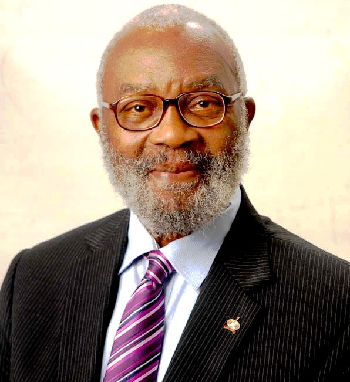
Proverbs 3:7-8 warns, “Do not be wise in your own eyes; fear the Lord and depart from evil. This will bring health to thy navel, and marrow to thy bones.” Malnourished bones are responsible for poor quality of bone marrow and blood. Therefore, health of the bone is fundamental to health of the body. Marrow nourishes and moistens the bones, thereby making them strong and healthy. Bone marrow produces red blood cells, platelets and white blood cells. When something goes wrong with the blood the whole body is affected. The Bible says that life is in the blood. The condition of the blood is always an indication of someone’s health.
What marrow is to the bones, the fear of God is to the soul of man. Fear of God will establish and strengthen people against sin and cause them to do the will of God. Fear of God is not only useful in the salvation of the soul but also in the health and welfare of the body. It will prevent those diseases which are often contracted through sinful lusts and passions. It will keep the soul in good state. It is the beginning of wisdom.
Obeying, honouring and pleasing God brings health to the body. On the contrary, disobeying, dishonouring and displeasing God is responsible for some sicknesses. Proverbs 4:20-22 says, “My son, give attention to my words; incline your ear to my sayings. Let them not depart from your eyes; keep them in the midst of your heart. For they are life to those that find them, and health to all their flesh.”
The fear of the Lord prolongs life: but the years of the wicked shall be shortened (Proverbs 10:27). The more we internalise the Word of God, the better for our health. The Word of God is medicine that we need to take always to bring healing. It has the power to change lives – to bring solutions to all emotional, physical, spiritual and relational issues. If you believe that the Word of God is medicine, how regularly do you comply with this divine prescription? How often do you take this medicine?
Obedience is a key to good health. Exodus 15:26 says, “If you diligently heed the voice of the Lord your God and do what is right in His sight, and give ear to His commandments and keep all His statutes, I will put none of the diseases on you which I have brought on the Egyptians. For I am the Lord who heals you.”
Disobedience to God is sin. And sin separates us from God, making us miss His provisions, mercy and grace. Disobedience attracts curses. Deuteronomy 28:15-68 has a long list of afflictions and diseases caused by not fully obeying God. Doctors and medicines cannot provide relief for such curses imposed by God. Verse 29 says, “And you shall grope at noonday, as a blind man gropes in darkness; you shall not prosper in your ways; you shall be only oppressed and plundered continually, and no one shall save you.”
Only God can reverse the prognosis of such disaster. Usually, sincere repentance resulting in the forgiveness of sin can cause reversal of the curse.
Those who serve and please God will be blessed. You must be carrying out God’s assignment wholeheartedly and giving generously to receive God’s blessings. Exodus 23:25 says, “So you shall serve the Lord your God, and He will bless your bread, and your water. And I will take sickness away from the midst of you.” Your vitality will be renewed as you serve God and you will not grow weary. You will be healed of your sickness and will be refreshed and strengthened. This will enable you to accomplish those things which God has planned for you to do.
This may appear like fantasy to some people because a natural man cannot receive the things of the Spirit of God. In fact, they are foolishness to him. In order to discern the spiritual implications of health, you must be born again. You must have a personal and intimate relationship with God.
NIGERIAN PHARMACEUTICAL DIRECTORY (FINAL NOTICE)
The NPD is the most recognised and respected reference publication on the Nigerian pharmaceutical industry, with Pharmanews Limited as publisher since 1980.
Attached is the pharmaceutical industry data form. Kindly fill legibly and return to us by email to pharmanews@yahoo.com before Thursday, 21st June, 2018, which is the final closing date.
We thank you for your cooperation.
What Do Nurses Really Do? (3)
Case management/care coordinator role
Case management refers to a systematic process by which the nurse assesses clients’ needs, plans for and co-ordinates services, refers to other appropriate providers, and monitors and evaluates progress to ensure that clients’ multiple service needs are met.
Hospitals can be overwhelming, intimidating, and, indeed, dangerous places, without someone to guide you and keep you informed. The nurse is the point person for all collaborating departments: medicine, pharmacy, nutrition, social work, physical and occupational therapy, surgery, etc.

Nurses ensure a patient’s safe passage through the hospital and organise care coordination in order to maximise timeliness, value, and efficiency and minimise injury, error, and inconvenience. Research has shown that nursing care coordination contributes in reducing overall charges, triggering significant increases in survival with notable decreases in relapses, complications and readmissions, ensuring improved quality care delivery, and enhancing overall patient satisfaction.
If you want to know how the countless spokes of any major medical centre’s wheels rotate with such a cohesive sense of safety, ask your nurse.
Collaborator role
Nurses seldom practice in isolation. They must work with many people, including clients, other nurses, physicians, pharmacists, social workers and community leaders, therapists, nutritionists, occupational therapists, psychologists, epidemiologists, biostatisticians, legislators, etc., as a member of the health team (Fairly 1993, Williams, 1986).
The nurse thus assumes the role of a collaborator, which means to work jointly in a common endeavour, to co-operate as partners.
Leader role
As a leader, the nurse directs, influences, or persuades others to effect change that will positively affect people’s health. The leadership role’s primary function is to effect change; thus, nurses act as agents of change. They also seek to influence people to think and behave differently about their health and the factors contributing to it.
Nurses engage individuals and organisations to lead patient-centered care initiatives and create needed change. Through committee participation and in-house policy development, nurses ensure that healthcare facilities are sensitive to the patient experience and promote environments that respond to the challenges and vulnerability faced by patients.
Nationally, nurses lead progress within their profession to anticipate the future healthcare needs in their countries and, globally, they collaborate across disciplines and with concerned citizens to ensure health and wellbeing for all.
In the community, community health nurses use evidence to implement policy changes and quality-based practices. They lead collaborative efforts to produce successful health outcomes and provide critical medical and social services in their communities.
Researcher role
In the researcher role, nurses engage in systematic investigation, collection and analysis of data for the purpose of solving problems and enhancing community health practice. Research literally means to search and/or to investigate, discover, and interpret facts. As researchers, community health nurses collect and use evidence to execute positive changes for better health. Research is used to validate funding for public health programmes, reduce inequalities in healthcare, and increase access to services.
Coach role
Nurses aid patients to attain their health goals and needs by honouring diverse cultures and beliefs, and approaching the patient as a “whole person” with a story worth knowing, respecting the patient as the sum of body-mind-emotion-spirit-environment. In other words, to nurses, as a client or patient, you are not just a bed number or diagnosis.
Coaching is fundamental to nursing practice and promotes partnership in healthcare, harmony, social interaction, and understanding that increases treatment outcome, in stark contrast to more traditional and paternalistic approaches to the provider-patient exchange
Disease prevention specialist
Nurses focus on long- and short-term care for disease prevention. Their work includes averting or controlling the spread of the flu and other communicable diseases. They also work with mothers of newborns to reduce the rate of infant mortality and in schools to identify gaps in services. Whether it is Ebola, Zika, budget challenges, hurricanes, clinic operations, dog bites, tuberculosis, sexually transmitted diseases or HIV, there is always a new challenge and a new opportunity for the nurse to make a positive difference.
Conclusion
It is pertinent to say that the list of the roles of nurses is inexhaustible, as they work in places that seemingly do not have direct connections with the healthcare system, such as academic settings, research institutions, forensic settings and a whole lot of multi-sectoral functions abound for the nurse to perform.
I would like to conclude this piece by sharing the thoughts of Judith Shamian, the 27thpresident of the International Council of Nursing (ICN). Judith stated in response to the question; “What is the Role of Nursing in Health?” thus:
“Our health status is determined by many factors and only 25% of it is related to the “healthcare system”. The remaining 75% is associated with social determinants of health such as education, housing, employment and more. So, if asked; does “nursing have a role in healthcare?” in my opinion the answer is YES”. She considers the role of nursing in health in a very broad way especially when global challenges are considered and complex topics are encountered. Topics like: universal health coverage (UHC); non-communicable disease (NCDS); emerging and re-emerging infectious diseases: Ebola, tuberculosis, upper respiratory illness; healthcare financing; systems integration; people-centred health systems; natural and man-made disasters; human resources for health, including workforce shortage, migration, task shifting and more. Judith posits that there are clear roles for nursing in four spheres, or in four different “bubbles”, namely: 1) the nursing bubble; 2) the health care bubble; 3) the regional/national bubble; 4) the global bubble – and the role of nursing is essential in each and every one of these “bubbles”.
In the global bubble, we will find organisations like: the World Health Organization, the World Bank, International Labour Organisations, United Nations Populations Fund (UNFPA) and many more. These organisations all have mandates that are directly linked to health.
For example, one would consider the World Bank as a financial institution and wonder what its role in health is. The reality, however, is that the World Bank is one of the biggest lenders and investors in the healthcare system, in poverty eradication, in building economies, and more. As such both the “health”, the “prosperity of the country”, the “healthcare system”, and subsequently the role of nursing will be significantly impacted by the actions and agreements that the World Bank will have with “regional and national” governments, which reside in the 3rd bubble i.e., the regional/national bubble. The role of nursing in bubbles one and two are usually understood by the nursing community.
For healthcare to be positively impacted, the nursing profession and nurses must be empowered to utilise the knowledge, skills, capacity and the desire they have and be given adequate recognition and representation at the various levels in “the bubbles”. Nurses’ impact can be enormous on healthcare systems if given the voice and allowed to exert influence. The society needs to learn about the knowledge and contributions nursing makes to health and more nurses need to be committed to strategic leadership positions In the interest of the health of the public.
The nursing workforce deserves collaboration and understanding to break all odds and break all obstacles to emerge as a force to reckon with and to evolve an all-encompassing healthcare system. The policy impact of the nursing voice, knowledge and experience needs to be greatly increased as global health will benefit tremendously at the policy level if nursing strategic leadership and global voice become more robust and have the presence it deserves.
By Comrade Nurse Abdrafiu Alani Adeniji
(National President, National Association of Nigeria Nurses and Midwives)
Call to Glory
With gratitude to God for a life well spent, the Diokpa Alex Odogwu family of Umueze Afadia, Umuaji Quarters, Asaba, Delta State, announces the death of their son-in-law, Senator Francis Onuora Nwajei, who passed on to eternity on 5 March, 2018, at the age of 80.
The deceased was among the first set of graduands, produced by the Faculty of Pharmacy, Obafemi Awolowo University (OAU), Ile-Ife, Osun State, in 1966.
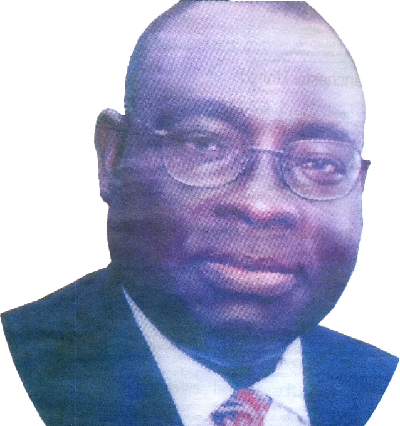
He is survived by his wife, Mrs Violet O.Odogwu-Nwajei (MON); children and a grandchild – Frances N. Nwajei; Melvyn O. Nwajei; Evelyn C.Nwajei; Donald I.Nwajei, and Kanaan C.Corriette.
Funeral arrangements are as follows:
Friday, 1 June 2018
Special Mass for the late Senator Francis Onuora Nwajei, at St. Francis Catholic Church, 2, Oremeji Street, Oregun, Ikeja, Lagos, by 5 p.m.
Tuesday, 5 June 2018
Service of Songs at St. Leo’s Catholic Church, 56, Toyin Street, Ikeja, Lagos, by 5 p.m.
Wednesday, 6 June 2018
Lying in State, at his residence, 2, Oremeta Street, Oregun Ikeja, Lagos, by 7: 30 am
He will be buried on Friday, 8 June 2018, at 9, Capwire Road, Asaba, after a Requiem Mass at St. Patrick’s Catholic Church, West End, Asaba.
UNIBEN Pharmacy Faculty Holds First Research Day
The Faculty of Pharmacy, University of Benin (UNIBEN) Edo State, Nigeria, recently held her first Faculty Research Day, hosted by the Dean of the faculty, Prof. J. O. Akerele. The Research Day, which is to be an annual event was aimed at providing a forum for researchers, academics and postgraduate students, working in the field of Pharmacy and Pharmaceutical Sciences, to have a platform for the presentation of their research results, innovations, products and activities.
The event, held at the University of Benin Banquet Hall, witnessed a large turnout of participants from various fields of endeavours including Academia, Industry, Business and Government functionaries.

In attendance were: The Vice-Chancellor, University of Benin, Prof. F.F.O. Orunmwense, represented by the Director, University of Benin Research and Publication Committee (URPC), Prof. F. E. Okieimen; Deputy Vice-Chancellor, Administration, Prof. Jacob Ehiorobo; University Librarian, Dr (Mrs) E. Idiodi; Director of Pharmaceutical Services, University of Benin Teaching Hospital (UBTH), Dr (Mrs) C. Olumese; Dr Tom O. Obaseki, chairman, Nigeria Erosion and Watershed Management Project (NEWMAP) and retired permanent secretary of the Ministry of Environment.
In his opening remarks, the Vice-Chancellor welcomed all participants and congratulated the Dean, Faculty of Pharmacy, Prof. J.O. Akerele and the assistant Dean, Dr (Mrs) Bafor for their ingenuity in putting forward such a great event, noting that the Faculty of Pharmacy is the first faculty to organise a research day in the University of Benin.
He encouraged other faculties to emulate the Faculty of Pharmacy. He also spoke on the need for research culture to be imbibed by every academic, while stressing that research is the only way the academics can showcase their inventions, innovations and contributions and thus make the universities to be properly placed in the scheme of things. On behalf of the Vice-Chancellor, Prof. Okieimen pledged financial support for the best two award winners of the Research Day.
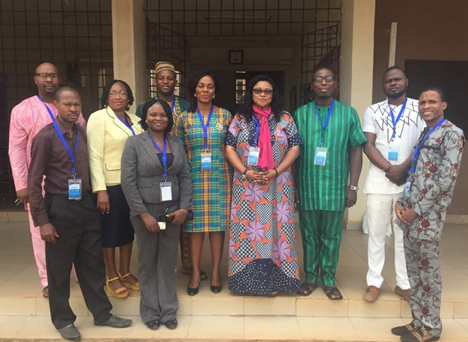
The Deputy Vice-Chancellor, Administration, Prof. Ehiorobo, also expressed his delight in such achievement by the faculty as he congratulated Prof. Akerele, and the assistant Dr Bafor, for the landmark and laudable accomplishment.
Dr Obaseki, an erudite scholar, a pharmacist and an enigma in playing pivotal role in positioning Edo State in the No. 1 position amongst 18 states in Nigeria, expressed his delight in the programme, noting that events of this nature can help in bridging the gap between the academia the government and the industry.
The major activity of the day was the presentation of stimulating research topics in the field of Pharmacy and Pharmaceutical Sciences, including Natural Product Chemistry; Pharmaceutical Analysis; Herbal and Alternative Medicines; Pharmacology; Toxicology; Cell Biology; Pharmaceutical Technology; Biotechnology; Microbiology; Clinical Pharmacy and Public Health. These were delivered in oral and in poster presentations by Lecturers/Researchers in the faculty as well as postgraduate students. The presentations were sandwiched with exciting guest lectures delivered by renowned academics. Among the guest speakers were Prof. C.O. Usifoh who spoke on grant writing and Prof. R.I. Ozolua who delivered a lecture on mentorship.
As part of the event was also a presentation by IWEMI Digital an e-resource for publishers.
The event was climaxed by the presentation of award certificates and prizes to outstanding oral and poster presenters in the various departments of the faculty.
Some of the award winners included: Pharm. Agbonlahor Okhuarobo, (Best oral presenter, Department of Pharmacology and Toxicology); Pharm. Issa O. Bello, (Best oral presenter, Department of Pharmacognosy); Dr Osayemwenre Erharuyi (Best oral presenter, Department of Pharmaceutical Chemistry); Dr (Mrs) Upe Babauiwa, (Best Oral Presenter, Department of Pharmaceutical Microbiology); Dr Collins Airemwen, (Best oral presenter, Department of Pharmaceutics and Pharmaceutical Technology) among others.
In addition, the overall best oral and poster presenter, Dr Valentine U. Odili, of the Department of Clinical Pharmacy and Pharmacy Practice and Dr (Mrs) S. Usifoh, of the Department of Clinical Pharmacy and Pharmacy practise, are to receive research grants from the University of Benin to boost their research efforts and to also encourage early and intermediate career investigators in their research endeavours.








